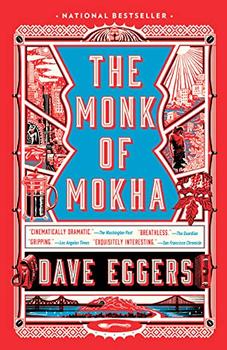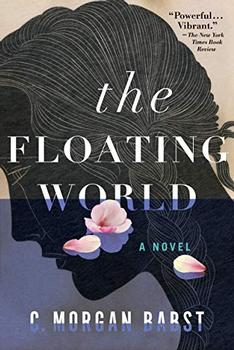Summary | Excerpt | Reading Guide | Reviews | Beyond the book | Read-Alikes | Genres & Themes | Author Bio

David Eggers' latest work, Zeitoun, relates the experiences of a well-respected Louisiana contractor and his wife before, during, and after Hurricane Katrina's landfall in 2005. It's an important book from the standpoint that it documents a small but significant piece of history in the words of someone who was actually present while events transpired. There are many who would like to deny, minimize or forget the disaster and the government's response to it, but Eggers relates events which need to be told and learned from so that the trials endured by Zeitoun (and others) don't recur.
The heart of the story, and the reason this book should be mandatory reading for all Americans, is Zeitoun's arrest and incarceration. It's simply something that one can't believe could happen in this country. Zeitoun is basically stripped of all rights afforded to U.S. citizens regardless of the crime of which they're accused; murderers and rapists are given more consideration than this honest man who did nothing more unlawful than ignore an evacuation order. It's horrifying and frightening to read how quickly processes broke down in the aftermath of the disaster. Although Eggers relates events from Zeitoun's perspective, he also makes it clear that Zeitoun's treatment was by no means exceptional. Approximately 1,200 others were held in open-air cages at Camp Greyhound (a temporary facility erected five days after Hurricane Katrina's landfall to contain those suspected of looting), including a 73-year-old church deaconess who was getting food out of her car when arrested, and a sanitation worker from Houston whose company had been hired to assist with clean-up. Eggers does a marvelous job of relating Zeitoun's experiences throughout while avoiding commentary or embellishment, letting events and actions speak for themselves. It's a powerful technique, allowing readers to reach their own conclusions about where the failures occurred, and it exacerbates the Kafkaesque nature of the situation, the feeling that the protagonist is in an absurd position beyond his control, with no escape or appeal.
Zeitoun is certainly a notable book and deserving of all the praise it's received, but it's not flawless. I found much of it plodding and poorly written - disappointing in light of Eggers' considerable literary talent. More than that, though, was the feeling that I was being overtly manipulated into having certain opinions or feelings toward the main character and his situation. All writers do this to some extent, but in Eggers' case it's blatant and heavy-handed. The first half of the book, for example, relates the lives and histories of Zeitoun and his Louisiana-born wife, Kathy. So much of the narrative focuses on the fact that the couple are Muslim, however, that it biases readers for what is to come. By the time we reach Zeitoun's arrest, we're predisposed to think his treatment is due to his Middle Eastern background, and some of the early summaries of the book go further to imply that this is the case. It eventually becomes apparent that Zeitoun's race and religion are immaterial to his situation, but by then the implication of racism is hard to shake.
I also felt Eggers' portrayal of Zeitoun was overly sympathetic. Yes, his ordeal was unjustified and inexcusable, and I do feel outrage on his behalf. It's clear from the narrative, though, that Zeitoun did bear some of the blame for the position in which he found himself. This aspect of the story is significantly downplayed in an attempt to spin him into the innocent victim of a dysfunctional system.
Criticism aside, Zeitoun is recommended for its behind the scenes view of "systemic ignorance and malfunction." The book's bottom line is that Zeitoun's ordeal could happen to anyone in this country under the right circumstances. Its simplistic style and important message make it a good choice for just about any type of reader, including young adults. Book groups will also find good fuel for discussion here.
Useful to know...
What's the difference between a hurricane and a tornado?
A hurricane differs from a tornado because the latter is a localized and violently destructive windstorm that occurs over land, and not necessarily in the tropics; whereas hurricanes occur in the tropics and are systems within themselves.
When is a hurricane a typhoon, and when is it a cyclone?
What is referred to as a hurricane in the Atlantic and eastern Pacific Oceans is generally called a typhoon in the western Pacific, and a cyclone in the Indian Ocean.
![]() This review
first ran in the June 9, 2010
issue of BookBrowse Recommends.
This review
first ran in the June 9, 2010
issue of BookBrowse Recommends.

If you liked Zeitoun, try these:

by Dave Eggers
Published 2019
From the best-selling author of The Circle and What Is the What, a heart-pounding true story that weaves together the history of coffee, the struggles of everyday Yemenis living through civil war and the courageous journey of a young man - a Muslim and a U.S. citizen - following the most American of dreams.

by C. Morgan Babst
Published 2018
A dazzling debut about family, home, and grief.
Anagrams
Click Here to find out who said this, as well as discovering other famous literary quotes!
Your guide toexceptional books
BookBrowse seeks out and recommends the best in contemporary fiction and nonfiction—books that not only engage and entertain but also deepen our understanding of ourselves and the world around us.